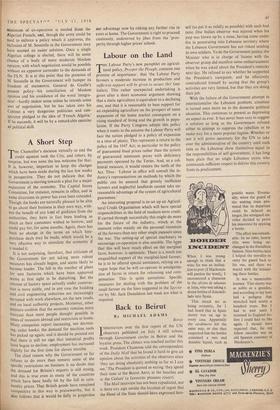Labour on the Land
ITNHE Labour Party's new pamphlet on agricul- tural policy, Prosper the Plough, contains one promise of importance : that 'the Labour Party favours a moderate increase in production and sufficient support will be given to secure this' (our italics). This rather unexpected undertaking is given after a short economic argument showing that a static agriculture is equivalent to a declining one, and that it is reasonable to base support for an expanding agriculture on the prospect of some expansion of the home market consequent on a rising standard of living and the growth in popu- lation. If the Party Congress adopts this policy when it meets in the autumn the Labour Party will face the nation pledged to a policy of expansion in a time of plenty. This represents a return to the policy of the 1947 Act; in particular to the policy of guaranteed fixed prices rather than the system of guaranteed minimum prices with deficiency payments operated by the Tories. And, as a col- lateral measure, it would restore the teeth of the Act. Thus : 'Labour in office will consult the in- dustry's representatives on methods by which the public can be assured that grossly inefficient farmers and neglectful landlords cannot take un- reasonable advantage of the system of agricultural guarantees.'
An interesting proposal is to set up an Agricul- tural Credit Organisation which will have special responsibilities in the field of medium-term credit. If carried through successfully this might do more for the future of the industry, which at the moment relies mainly on the personal resources of the farmers than any other single measure since the war. The setting-up of special machinery to encourage co-operation is also sensible. The hgpe that this will have much effect on the marginal farm, however, is optimistic. There is a much too unqualified support of the marginal-land farmer; he is to be offered special assistance, relying on a vague hope that he will co-operate in amalgama- tion of farms in return for rehousing and com- pensation. This is quite unrealistic. Specific measures for dealing with the problem of the small farmer on the lines suggested in the Specta- tor by Mr. Jack Donaldson last week are what is required.


































 Previous page
Previous page